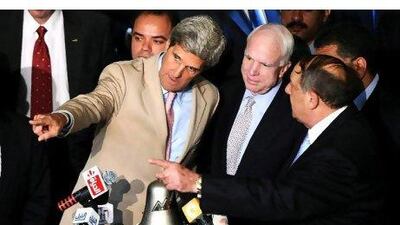CAIRO // Two senior senators from the United States, both former presidential candidates, said Egypt was in urgent need of investment and economic revitalisation to set the country on the path to democracy.
Speaking yesterday at a Coca-Cola factory on the outskirts of Cairo, Senator John McCain, the Republican presidential candidate in 2008, said: "The success or failure of the revolution in this heart of the Arab world will be directly related to the ability to provide investment and jobs for the Egyptian people".
Mr McCain was accompanied by Senator John Kerry, chairman of the senate foreign relations committee and the Democratic Party's presidential candidate in 2004, and several US businessmen, including Jeffrey Immelt, the chief executive of General Electric.
The uprisings across the Middle East were spurred by a lack of freedom and democracy, but also by pressing economic issues for millions of people unable to get access to education and jobs opportunities to provide for their families, Mr McCain said.
Egypt has been beset by increasing economic woes since the revolution began on January 25. Gross domestic product fell by 4 per cent in the first quarter of the year and official reserves have declined by US$9 billion (Dh33bn). The tourism industry has been among the worst affected, with visitors down more than 35 per cent in April compared to the same month in 2010. The unemployment rate is above 9 per cent.
A financing gap of roughly $11bn remains for the government in the year ahead, according to the ministry of finance. Some of this will be funded by donations and aid from other Arab countries, such as Qatar and Saudi Arabia, and the industrialised nations. Leaders at the Group of 8 said that $20bn would be made available for Egypt and Tunisia in the aftermath of their revolutions.
There is suspicion among many Egyptians that foreign aid will come with conditions that will take the reins of the government away from the people. Samir Radwan, the minister of finance, said on Saturday that the government had rejected loans from the International Monetary Fund and World Bank and was seeking funds elsewhere.
Mr Kerry said that the US should not impose any standards on Egypt, but it would confirm that any funds it gave to the country would be used in a way to maximise the creation of new jobs and the stability of the economy.
Specific domestic policies are "up to the people of Egypt, through their government, through their democracy that they are still fighting for", he said.
The economic situation is becoming the central issue for nascent political parties, but few groups or presidential candidates have outlined an extensive policy platform for how they would improve the country's finances and remedy the stark disparity between rich and poor.
More than four in five of respondents (82 per cent) in a survey conducted by the Abu Dhabi Gallup Centre released earlier this month said improving the economy was "very important".
Dalia Mogahed, director of the Abu Dhabi Gallup Centre, said at the time: "There has been a lot of focus on important things like corruption and holding Mubarak accountable, but there hasn't been enough of a debate inside Egypt about the right economic policies to make going forward. The debate around the economy is really going to be the next phase."
Without a pickup in the economy, Egypt's newly freed democracy could be at risk, said Nabil Fahmy, a former Egyptian ambassador to the United States and now a professor at the American University of Cairo.
"There is a need to address the liquidity crunch so that the electoral process and the formation of the constitution occurs in a positive, constructive environment of hope, rather than one of frustration and economic pressure," he said.
Mr Fahmy added that there were signs that the economy was slowing its decline, but crucial industries would still not see stabilisation until the autumn at the earliest. Funds were needed for small and medium-sized businesses to boost jobs.
Mr Immelt, of General Electric, said at a press conference that foreign businesses were already certain of Egypt's economic importance in the region, but transparency and stability were needed to bring in more investment.
"You don't have to sell me on Egypt," he said, adding that a pressing question was "how can we accelerate the financing so that these big infrastructure projects can take place".
The senators visited top Egyptian officials during their visit to discuss ways for the US to support the country in the postrevolutionary period.
Field Marshal Hussein Tantawi, the head of the supreme council of the armed forces who has been the interim leader of the country since Hosni Mubarak resigned as president on February 11, told the delegation that it wanted to expedite a handover to a civilian government.
"I think they are very anxious to get out of the business of governing," Mr Kerry said. "They want a civilian government to take over responsibility."

